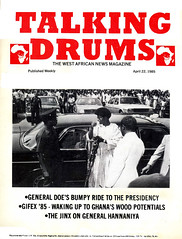Comment
London Knows Best
Thus one of the more spectacular displays was on show this past week for the state visit of President-for-Life Dr Hastings Kamuzu Banda. The Queen and much of the British aristocracy had one of those increasingly rare opportunities to put on show a glittering extravaganza for Dr Banda. The newspapers, columnists, experts all weighed in even though some of the commentators on the radio could still refer to Malawi as Nyasaland.
It seems no praise could be too much for Dr Banda, he has given his country stability and he has been a long- standing friend of Britain. Yes, they did mention that he has ruled his country with an iron fist, but everybody would be forgiven for thinking that was also one of his great achievements - that is the way it came out.
If somebody was troubled by the ruthless hand that Dr Banda has wielded over his countrymen, nobody was letting that get in the way of honouring "one of the most respected and long-lasting friends of Britain" and if those among the British liberal establishment felt any twinge of conscience about how President Banda became "President-for-Life" well, they were not going to spoil a jolly good show.
If nobody knew President Banda's real age, that was only one of the quaint items that makes Africa so absolutely fascinating. And anyway, anybody who has built and established a full-scale 'Eton', boaters and all, in the middle of an African jungle cannot but be a jolly good fellow; if he has repressed his fellow Malawians, that should really not be mentioned in decent company.
In the meantime, young Chirwa looked on in amazement. Some people might forgive him if he wondered if indeed Britain was the home of Parliaments, where individual rights are highly valued, where the rule of law is valued, where the ordinary citizen has the protection of the law, where the leaders can be challenged by everybody and be voted out of power by the people.
Thanks to Amnesty International at least the Chirwas' case is well-known and it is only because of their efforts that they are alive at all. Their son, standing among the crowd on the London street watching the regal process of Dr Banda and hearing the fulsome praises being showered on the President-for-Life, would surely despair of his parents ever making it out of Banda's prisons alive. He would learn very quickly, and with everlasting clarity though, that the measures that are used to judge foreign leaders and governments are quite different from those the British apply to themselves and their leaders. Whether he will, as an adult, believe in parliamentary democracy, liberty of the individual, protection under the law and all the other virtues that the British pride themselves on and claim to lead the world on and which theories are undoubtedly being taught to him by the experts of the British schools, will all depend on time. Undoubtedly it will not be lost on him that his godfather President-for-Life qualified for the ultimate in British hospitality and grandeur without paying the least attention to those ideals.
And as though the point needed emphasizing, there was on display the Sunday before the Banda visit, another example of one of those highly acclaimed British world-leading phenomena - the British press.
The flagship of Independent Television's current affairs programmes 'Weekend World' had one of those "authoritative" analyses of what ails Africa. In the midst of all the discussions and photographs of the famines, confusion and the gloom that is Africa, Flight-Lieutenant Jerry Rawlings' Ghana was chosen as an example of a country that is getting it right or at least the government was doing all the right things - if only more western aid will be given to it to keep in power one of those leaders prepared to take bold and necessary decisions.
Flight-Lieutenant Rawlings, it was said, had taken the bold decisions to favour the farmers and had devalued the currency and removed subsidies on goods that are important only for the unproductive urban population. Experts from universities, World Bank and other pundits were wheeled out to give their "authoritative" backing to the theory. Obviously it was not considered important by the programme makers to consider that for the first 18 months of his rule these very economic measures were constantly condemned by Fit-Lt. Rawlings and that he had offered as one of the major reasons for his coup d'etat, the accusation that the elected civilian regime was on the verge of "mortgaging the country to the IMF and World Bank", and nobody considered it important to mention that the bulk of Rawlings' support came from what he called "the workers' - the very urban population now allegedly posing the opposition to him. The programme went to great lengths about the need to increase British aid to support such countries and lamented that the British government had cut down on its foreign aid programme. But British journalism is nothing if not efficient and it knows that governments would be swayed by public opinion.
Thus 'Weekend World' had commissioned an opinion poll on whether Britain should increase its aid to Africa and the figures spoke for themselves and the U.K. government will ignore them at its own peril: increase aid.
It was obviously not considered important to consider that what the people of Ghana wanted could remotely feature in how their affairs are conducted. The fact that Rawlings imposed himself on them is obviously irrelevant; it has been decided by the experts that Rawlings is good for Ghana. The fact that his word is law is irrelevant, he is a bold man and firm leader and is willing to take decisions that have been deemed to be good for Africa, what the people think and feel are not considerations.
